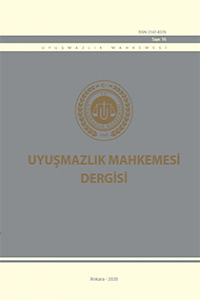(İngiliz Teamül Hukuku Sisteminde Mahkemelerin Yorum ve Kanun Yapması)
Anglo-Sakson hukuk sistemi veya kıta Avrupası hukuk sistemine sahip olup olmadığına bakılmaksızın ülkelerin çoğunda kanun yapımında parlamentolar önceliğe sahiptirler. Parlamento seçilmiş bir organ olarak kanun çıkartır veya kanunu değiştirir ya da iptal ederken mahkemeler ise çıkarılan kanunları uygular ve yorumlar veya önündeki somut bir davayı çözmesini sağlayacak kanun veya içtihat yok ise kendisi kanun koyucu gibi kanun yapar. Parlamento için daha da ötesi, teamül hukukunun içtihatlarını açıklamak, dönüştürmek ve değiştirmektir. Hakimin esas görevi yorum tekniklerine başvurarak kanunları yorumlamaktır.Bu makale Anglo-Saxon hukuk sisteminin önde gelen uygulayıcısı olan İngiltere’deki kanun yorumlama kuralları hakkında kısa bir açıklama yapmayı amaçlamıştır. Bu kurallar başlıca dört başlık altında ele alınmıştır: lafzi kural, altın kural, problemli kural ve amaçsal yaklaşımdır. Bunun dışında, çalışmada mahkemelerin yorum yapma dışındaki görevlerinden de bahsedilmektedir
Anahtar Kelimeler:
Teamül hukuku, parlamento, mahkeme, hakim, yorum kuralları
INTERPRETATION AND LAWMAKING BY THE COURTS IN ENGLISH COMMON LAW SYSTEM (İngiliz Teamül Hukuku Sisteminde Mahkemelerin Yorum ve Kanun Yapması)
Parliaments have a supremacy in the making Law in the most ofthe states regardless it has the common law system or civil law system.Parliament as an elected power that adopts, replaces, or repeal lawswhereas courts implement and interpret the enacted laws and makes lawswhere a relevant law or precedent is absent to solve a problem in a specificcase. The more for the parliament is clarifying, modifying or replacing thecommon law precedents and jurisprudence. The judges’ main task is tointerpret the statutes utilizing the rules of interpretation.This essay aims to give brief explanation on the rules of interpretationin the United Kingdom as a foremost common law example. These rulesare examined under the mainly four titles: the literal rule, the golden rule,the mischief rule and the purposive approach. Apart from this issue thearticle mentions the tasks of the courts beyond the interpretation.
Keywords:
-,
___
- ADAMS J N, and BROWNSWORD R, Understanding Law, 3th edn, Sweet&Maxwell, 2003.
- BELL J and ENGLE G, Cross Statutory Interpretation, 2th edn, Butterworths Publishing, London, 1987.
- DWORKIN R M, ‘The Model of Rules’, (1967), Faculty Scholarship Series, Paper 3609, 14-46.
- ELLIOTT C, English Legal System: Essential Cases and Materials, Pearson Publishing, Harlow, 2009.
- FOWLER R L, ‘The Future of the Common Law’, (1913), 13 Colum LR , 595–611.
- HART H L A, The Concept of Law, 2nd edn, Oxford university Press, Oxford, 1994.
- GARDNER J, ‘Some Types of Law’ in Common Law Theory, Douglas E Edlin (ed), Cambridge University Press, Cambridge, 2007, 51-80.
- WOOLF L, ‘Droit Public - English Style’ (1995) PL 57.
- MALLESON K, The Legal Systems, Lexis Nexis, London, 2003.
- MARTIN J, Key Cases in the English Legal System, Hodder Education Press, London, 2011.
- SALES P, ‘Judges and Legislature: Values into Law’ (2012) CLJ 71(2), 287–
- SLAPPER G and KELLY D, The English Legal System, 13th edn, (Routledge Press, London, 2013).
- TWINING W and MIERS D, How to Do Things with Rules, 5th edn, (Cambridge University Press, Cambridge, 2010).
- ZANDER M, The Law-Making Process, 6th edn, (Cambridge University Press, Cambridge, 2003). CASES
- Adler v George [1964] 1 All ER 628.
- Alcock and others v Chief Constable of the South Yorkshire Police [1992] 1 AC
- Attorney General v Prince Ernest Augustus of Hanover [1957] 1 All ER 49.
- Barker v Corus Ltd [2006] 2 AC 572.
- British Railways Board v Pickin [1974] 1 All ER 609.
- Brutus v Cozens [1972] 2 All ER 1297.
- CR v United Kingdom, 48/1994/495/577 ECH.
- Fairchild v Glenhaven Funeral Services Ltd [2003] 1 AC 32.
- Fisher v Bell [1960] 1 QB 394.
- Heydon’s Case [1584] 76 ER 637.
- Maunsell v Olins [1975] 1 All ER 16.
- McLoughlin v O’Brian [1983] 1 AC 410. Pepper v Hart [1993] AC 593. R v R [1992] 1 AC 599.
- R v S of S for Health ex parte Quintavalle, [2003] 2 WLR 692.
- R v Judge of the City of London Court [1892] 1 QB 273.
- R v Allen [1872] LR 1 CCR 367.
- R v Ghosh [1982] 2 All ER 689.
- Re A (Children) [2001] 2 WLR 480.
- River Wear Commissioners v Adamson (1876-77) LR 2 App Case 743.
- Seaford Court Estates Ltd. v Asher [1950] 2 All ER 1236.
- Smith v Hughes [1960] 1 WLR 830.
- Sussex Peerage Case [1884] 8 ER 1034.
- Wilson v Secretary of State for Trade and Industry [2004] 1 AC 816.
- ISSN: 2147-8376
- Başlangıç: 2012
- Yayıncı: T.C. UYUŞMAZLIK MAHKEMESİ
Sayıdaki Diğer Makaleler
KİMLİĞİ BİLDİRMEME KABAHATİNİN ÖZGÜRLÜK VE GÜVENLİK HAKKI BAĞLAMINDA DEĞERLENDİRİLMESİ
Prof. Dr. Ali TÜMER, Doç. Dr. Aysun ODABAŞI, Doç. Dr. Dilşad ÖZDEMİR, Yrd. Doç. Dr. Erdem MUTLU, Dr. Ayşe KAYNAK
UBER, HUKUKİ SORUNLAR VE ÇÖZÜM ÖNERİLERİ
YARGI ORGANLARINCA HÜKMEDİLEN VEKÂLET ÜCRETİNİN AİDİYETİ SORUNU
SEÇİM SİSTEMLERİNİN SİYASAL SONUÇLARI
(İngiliz Teamül Hukuku Sisteminde Mahkemelerin Yorum ve Kanun Yapması)
(Birleşmiş Milletler İnsan Hakları Sözleşmelerinde Bireysel Başvuru Usulü: Etkinlik Sorunu)
